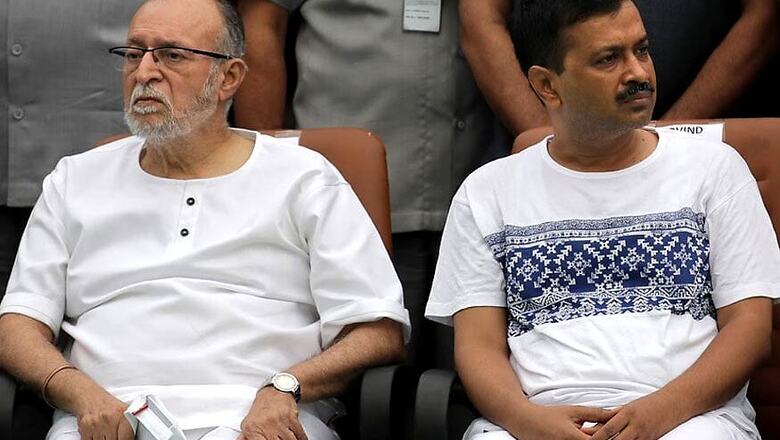
views
New Delhi: A day after the Supreme Court verdict which outlined the powers of the Lieutenant Governor in Delhi, Union Minister Arun Jaitley has said that “silence on issues cannot imply a verdict in favour of anyone" and that Centre still had an upper hand over both L-G and Delhi Govt in situations where L-G differs with Delhi government citing reasons.
Arun Jaitley’s response to the SC verdict was after many hailed the verdict by the five judge constitution bench as a victory for the Aam Aadmi Party.
Although Jaitley has accepted that “in the larger interest of democracy and federal politics," the Lieutenant Governor should accept the exercise of power by the State, but if he has strong reasons then he may differ and that decision of the central government will be binding then.
“If the L-G has good and cogent reasons supported by material to disagree, he can record the same in writing and refer the same to the President (i.e. the Central Government), which will resolve the difference of opinion between the State Government and the Lieutenant Governor. The decision of the Central Government will be binding both on the Lieutenant Governor and the elected State Government. Thus hereto the opinion of the Centre is overriding," said Jaitley.
It was the first occasion also when the Supreme Court authoritatively ruled upon the manner in which the Constitution prefers the three institutions - Centre, L-G and Delhi government - to coexist harmoniously to serve the interest of the people.
The unanimous judgment by Chief Justice of India Dipak Misra, Justices AK Sikri, AM Khanwilkar, DY Chandrachud and Ashok Bhushan, emphasised elected government has to be given authority to function because the democracy, by design, guaranteed an elected government to represent will of the people - who are sovereign.
However, Jaitley has stated that not only can Delhi cannot compare itself with other Union territories, but also will not be able to set up any investigative agency.
“If Delhi has no police powers, it cannot set up investigative agency to investigate crimes as had been done in the past. Secondly, the Supreme Court has held categorically that Delhi cannot compare itself at par with other States and, therefore, any presumption that the administration of the UT cadre of services has been decided in favour of the Delhi Government would be wholly erroneous," said Jaitley in his public post.
Jaitley has also thrown open a question on who should be controlling law and order, police in Delhi if not the Delhi government.
“Delhi unquestionably is a Union Territory. Its power structure has to be separate and distinct. It is the seat of the Central Government, the Supreme Court, the Rashtrapati Bhawan, offices of the Central Government, embassies of foreign countries are located in Delhi, and heads of foreign States are frequent visitors to Delhi. Who should, therefore, be controlling the law and order, police, land and various other facets of Delhi?" wrote Jaitley.
Though the Supreme Court has laid down that the L-G must not act in an “obstructionist" way and that he has no “Right to Differ" in cases where the council of ministers refer matters to him, Jaitley has stated that according to verdict, “L-G must be informed of all decisions taken by the council of ministers."
“The Lieutenant Governor of Delhi is bound by the aid and advice of the State Council of Ministers and has no independent power to overrule the power of the State Cabinet. It is incumbent on the State, however, to keep the Lieutenant Governor informed of the exercise of these powers," said Jaitley.
One of the major expectations from the verdict was how the judges would elucidate their stand on the aspect of services, especially with regard to the 2015 notification citing which the IAS officers had ceased to take orders from the AAP government. However, rather than elaborating on this, the court has referred the matter to a regular bench to decide on broader issues.
Now, Jaitley has stated that if the SC is silent on some of the issues then it should not be assumed that it’s in favour of some.
“There are several issues which had directly not been commented upon but by implication there is some indication of those issues. However, unless issues of importance are flagged, discussed and a specific opinion is rendered, none can assume that silence implies an opinion in favour of one or the other. There are two obvious indications," wrote Jaitley.
The Constitution Bench verdict, interestingly, has shifted the burden on the L-G when the latter chooses to interdict the will of the elected government.
The judicial fetter has been evolved on the exercise of the power of the L-G, who cannot now act only on his whims, bypassing the representative government which is responsible to the sovereign in the democracy.
The L-G may act, may differ but he must be mindful that his resistance is not on trivial issues and that he is acting either in the larger interest of the nation or strictly under the powers vested with his office under the Constitution.



















Comments
0 comment